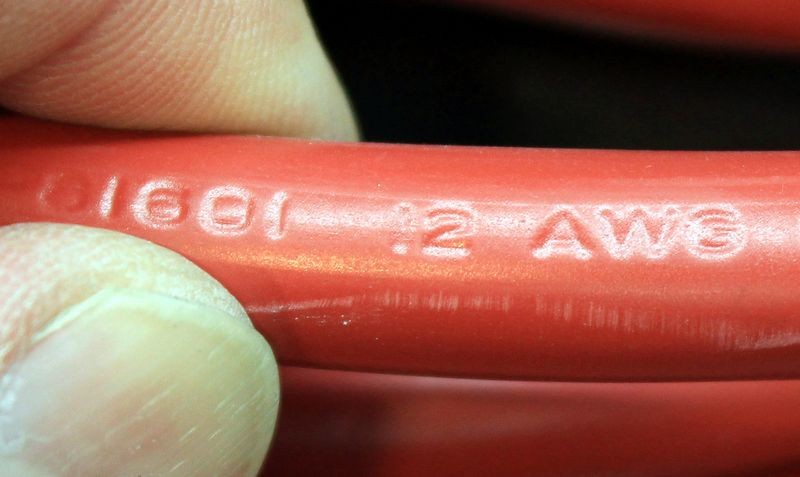Mike Phillips
Active member
- Dec 5, 2022
- 51,004
- 6
Review: FLEX 50 Foot - Heavy Duty Extension Cord - Don't use cheap cords with expensive power tools
FLEX 50' Heavy Duty 12 AGW Power Cord

FLEX Tools North America introduced their brand new 50' Heavy Duty 12 AGW extension cord at SEMA and Bob Eichelberg was kind enough to give me one of the first cords available.
Here's the imprint in the cord showing the wire gauge size

Das Original Cord Features
The problem
If you use to light of gauge wiring in and extension cord the wire itself hinders the flow of electricity to the tool. This can harm the electrical components inside the tool and cause these components to burn out. The cord itself will get hot due to the impedance of electricity flow. In fact, you should NEVER feel heat or warmth coming from your extension cords when using FLEX tools. If you do this is sign that the cord is too light duty for the tool.
The solution
A heavy duty extension cord that uses a minimum of 12 AGW wire. The longer the cord the more important it is for the cord to use 12 AGW wire. The FLEX 50' Heavy Duty 12 AGW Extension Cord is the solution FLEX offers all their tool customers to protect their tool investment while providing the correct flow of electricity to the tool.
What does AWG mean?
American Wire Gauge (AWG) is a U.S. standard set of non-ferrous wire conductor sizes. The "gauge" means the diameter. Non-ferrous includes copper and also aluminum and other materials, but is most frequently applied to copper household electrical wiring. Typical household wiring is AWG number 12 or 14. The higher the gauge number, the smaller the diameter and the thinner the wire. Since thicker wire carries more current because it has less electrical resistance over a given length, thicker wire is better for longer distances. For this reason, where extended distance is critical, it's vital for the performance of the current delivery to use thicker gauge wire.
My comments...
I know for a fact that too many guys are using extension cords that don't use the correct gauge wire for the tool they are using. I'd even say that there's a lot of people in all industries that have no clue that the gauge thickness of the wire in the extension cords they are using are just as important as the tool. I know from posts on our forum over the years that too many people are experiencing overheating problems with their polishers and blaming the polisher when the root cause is the extension cord.
Plus with a 50' cord you'll never have to plug in two 25' cords to reach from your plug-in to your project.
On Autogeek.com
FLEX 50 ft. 12/3 SJTW HD Extension Cord

FLEX 50' Heavy Duty 12 AGW Power Cord

FLEX Tools North America introduced their brand new 50' Heavy Duty 12 AGW extension cord at SEMA and Bob Eichelberg was kind enough to give me one of the first cords available.
Here's the imprint in the cord showing the wire gauge size

Das Original Cord Features
- Made in America
- Heavy duty 12 gauge wire thickness
- 50' length
- Lighted plug end
- Flexible rubber outside won't kink
The problem
If you use to light of gauge wiring in and extension cord the wire itself hinders the flow of electricity to the tool. This can harm the electrical components inside the tool and cause these components to burn out. The cord itself will get hot due to the impedance of electricity flow. In fact, you should NEVER feel heat or warmth coming from your extension cords when using FLEX tools. If you do this is sign that the cord is too light duty for the tool.
The solution
A heavy duty extension cord that uses a minimum of 12 AGW wire. The longer the cord the more important it is for the cord to use 12 AGW wire. The FLEX 50' Heavy Duty 12 AGW Extension Cord is the solution FLEX offers all their tool customers to protect their tool investment while providing the correct flow of electricity to the tool.
What does AWG mean?
American Wire Gauge (AWG) is a U.S. standard set of non-ferrous wire conductor sizes. The "gauge" means the diameter. Non-ferrous includes copper and also aluminum and other materials, but is most frequently applied to copper household electrical wiring. Typical household wiring is AWG number 12 or 14. The higher the gauge number, the smaller the diameter and the thinner the wire. Since thicker wire carries more current because it has less electrical resistance over a given length, thicker wire is better for longer distances. For this reason, where extended distance is critical, it's vital for the performance of the current delivery to use thicker gauge wire.
My comments...
I know for a fact that too many guys are using extension cords that don't use the correct gauge wire for the tool they are using. I'd even say that there's a lot of people in all industries that have no clue that the gauge thickness of the wire in the extension cords they are using are just as important as the tool. I know from posts on our forum over the years that too many people are experiencing overheating problems with their polishers and blaming the polisher when the root cause is the extension cord.
Plus with a 50' cord you'll never have to plug in two 25' cords to reach from your plug-in to your project.
On Autogeek.com
FLEX 50 ft. 12/3 SJTW HD Extension Cord
Last edited by a moderator: